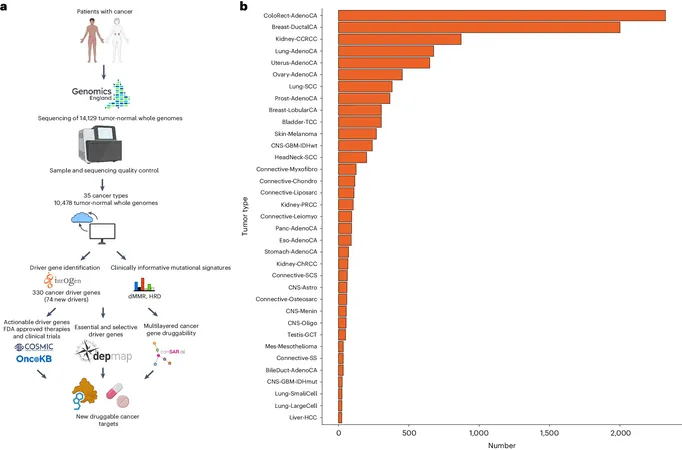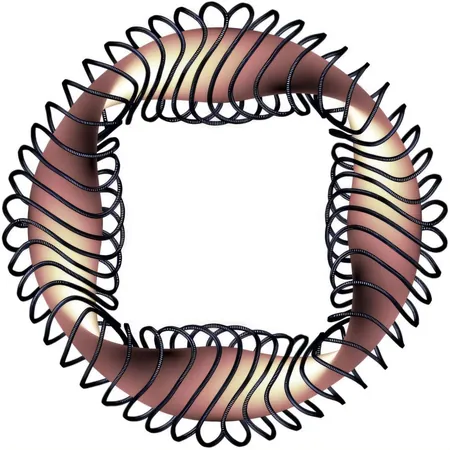
Groundbreaking Discovery of Cancer-Driving Genes Paves the Way for Tailored Treatments
2024-11-19
Author: Mei
Groundbreaking Discovery of Cancer-Driving Genes Paves the Way for Tailored Treatments
In a revolutionary study that could reshape cancer treatment, researchers analyzing over 10,478 cancer genomes from 35 diverse cancer types have uncovered 330 potential cancer-driving genes. Among these, an astonishing 74 genes were newly identified as being associated with cancer, unveiling significant opportunities for developing targeted therapies for patients battling this devastating disease.
Unraveling the Genetic Code of Cancer
Utilizing data from the groundbreaking UK 100,000 Genomes Project, the researchers meticulously identified DNA alterations, known as driver mutations, responsible for the transformation of healthy cells into malignant ones. By examining whole-genome sequences—an increasingly vital tool in precision cancer medicine—the team found mutations that had gone unnoticed in previous studies.
With this extensive dataset, researchers detected a wealth of previously unidentified driver mutations among the 330 genes linked to various cancer types, particularly colorectal, breast, lung, and uterine cancers. Noteworthy genes, like MAP3K21 and TPTE, emerged as crucial players in bowel, breast, and lung cancer, respectively, further highlighting the complexity and diversity of cancer genomics.
Transforming Treatment Paradigms
The implications of these findings are profound. The study indicates that over half of the samples analyzed contained actionable mutations that could guide oncologists in selecting appropriate therapies, particularly for those with DNA repair deficiencies. For instance, patients exhibiting profiles linked to homologous recombination deficiency could be prime candidates for PARP inhibitors—targeted drugs currently in use for specific breast and ovarian cancers.
Interestingly, the majority of participants in the study were younger and represented early-stage tumors, suggesting that further investigation is necessary to validate the results across a broader population.
A New Dawn for Targeted Therapies
The insights gained from this comprehensive analysis of cancer genomes not only illuminate existing treatment pathways but also suggest that treatments like PARP inhibitors could be optimized for a much larger patient base. The authors stress the critical need for expanding current sequencing panels in clinical settings, allowing for the identification of smaller subsets of patients who could benefit from novel targeted treatments.
Dr. Amit Sud, a leading researcher in the study, commented on the transformative potential of these findings: "By delving deep into the genetic underpinnings of cancer, we have opened doors to new therapeutic strategies. Our aim is to translate these discoveries into tangible advancements in cancer care."
The Future of Precision Oncology
As whole-genome sequencing technology becomes more affordable, integrating this comprehensive testing method into standard cancer care could revolutionize the way oncologists diagnose and treat cancer. Professor Richard Houlston emphasized, "While precision oncology has made significant strides in the past 25 years, there remains untapped potential to benefit a wider array of patients through personalized treatment strategies driven by genomic insights."
In conclusion, the identification of new cancer-driving genes offers not just hope but a promise of a future where treatments are specifically tailored to the genetic makeup of individual tumors, drastically improving outcomes for millions affected by cancer worldwide. The dawn of precision oncology could be upon us, ushering in an era of highly personalized care that prioritizes patient characteristics over traditional treatment protocols.



 Brasil (PT)
Brasil (PT)
 Canada (EN)
Canada (EN)
 Chile (ES)
Chile (ES)
 España (ES)
España (ES)
 France (FR)
France (FR)
 Hong Kong (EN)
Hong Kong (EN)
 Italia (IT)
Italia (IT)
 日本 (JA)
日本 (JA)
 Magyarország (HU)
Magyarország (HU)
 Norge (NO)
Norge (NO)
 Polska (PL)
Polska (PL)
 Schweiz (DE)
Schweiz (DE)
 Singapore (EN)
Singapore (EN)
 Sverige (SV)
Sverige (SV)
 Suomi (FI)
Suomi (FI)
 Türkiye (TR)
Türkiye (TR)